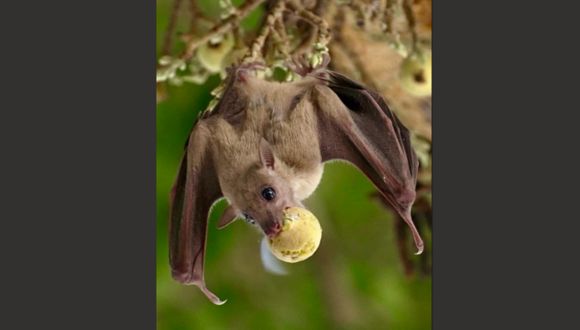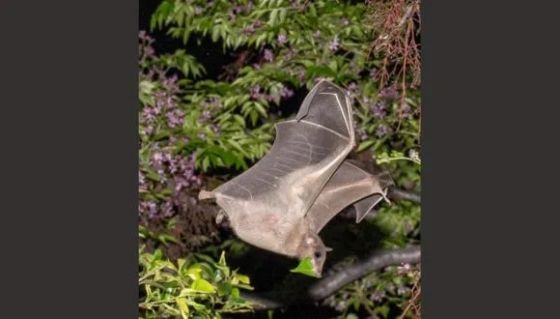Researchers at Tel Aviv University tracked free-ranging Egyptian fruit bats from a colony based in the TAU’s I. Meier Segals Garden for Zoological Research to answer a long-standing scientific question: Do animals have high and complex cognitive abilities, previously attributed only to humans? In particular, the study focused on the traits of episodic memory, mental time travel, planning ahead, and delayed gratification, arriving at highly thought-provoking conclusions.
The study was led by Prof. Yossi Yovel and Dr. Lee Harten from the School of Zoology and Sagol School of Neuroscience at Tel Aviv University. Other researchers included: Xing Chen, Adi Rachum, Michal Handel, and Aya Goldstein from the School of Zoology, Lior de Marcas from the Sagol School of Neuroscience, and Maya Fenigstein Levi and Shira Rosencwaig from the National Public Health Laboratory of Israel’s Ministry of Health. The paper was published in Current Biology.

Prof. Yossi Yovel.
Prof. Yovel: “For many years the cognitive abilities to recall personal experiences (episodic memory) and plan ahead were considered exclusive to humans. But more and more studies have suggested that various animals also possess such capabilities. Still, nearly all of these studies were conducted under laboratory conditions, since field studies on these issues are difficult to perform. Attempting to test these abilities in wild animals, we designed a unique experiment relying on the colony of free-ranging fruit bats based in TAU’s I. Meier Segals Garden for Zoological Research”.
How Bats Keep Track of Food Resources
The researchers assumed that bats depending on fruit trees for their survival would need to develop an ability to track the availability of food both spatially (where are the fruit trees?) and over time (when does each tree give fruit?). Navigating through landscapes with numerous fruit and nectar trees, they would need to mentally track the resources in order to revisit them at the appropriate time. To test this hypothesis, a tiny high-resolution GPS tracker was attached to each bat, enabling the documentation of flight routes and trees visited for many months. The vast data collected in this way were thoroughly analyzed, producing some amazing results.
The first research question was: Do bats form a time map in their minds? To explore this issue, the researchers prevented the bats from leaving the colony for varying periods of time, from one day to a week. Dr. Harten: “We wanted to see whether the bats could tell that time had elapsed and behave accordingly. We found that after one day of captivity, the bats would return to trees visited on the previous night. However, when a whole week had gone by, the older bats, based on past experience, avoided trees that had stopped bearing fruit in the interval. In other words: they were able to estimate how much time had passed since their last visit to each tree and knew which trees bore fruit for a short time and were no longer worth visiting. Young, inexperienced bats were unable to do this, indicating that this is an acquired skill that must be learned”.

While the first research question looked at past experiences, the second dealt with the future: Do the bats exhibit future-oriented behaviors? Are they capable of planning ahead? To address this issue the researchers observed each bat’s route to the first tree of the evening, possibly indicative of plans made before leaving the colony. Chen Xing: “We found that usually the bats fly directly to a specific tree they know, sometimes 20 or 30 minutes away. Being hungry, they fly faster when that tree is further away, suggesting they plan where they are heading.
Moreover, focused on their chosen target, they will pass by other trees, even good sources visited just yesterday – indicating a capacity for delayed gratification. We also found that the first bats to leave the colony choose trees bearing fruits rich in sugar, while the bats that leave later seek proteins.” All these findings suggest that the bats plan their foraging before they leave the colony, and know exactly where they are flying and what kind of nourishment they are looking for.
Rethinking Intelligence in Animals
Prof. Yovel: “The cognitive gap between humans and animals is one of the most fascinating issues in science. Our study demonstrates that fruit bats are capable of quite a complex decision-making process involving the three questions indicative of cognitive abilities: Where? (each tree’s location); When? (when the tree bears fruit); and What? (the nourishment it provides – sugar vs. proteins). Once again we find that the gap is not cleat-cut, and that humans are not as unique as some might think. Apparently, humans and animals are all located on a spectrum, with almost any human ability found in animals as well”.

